Hospitality sector on its way to full recovery
The biannual event attracted an array of industry leaders, including investors, hotel owners, management companies, design firms, and consultants.
 |
Through fostering collaboration, offering insights, and providing networking opportunities, MTE supports stakeholders in capitalising on market growth and gearing up for future cycles in Vietnam’s dynamic real estate and hospitality sectors.
Vietnam’s tourism sector has experienced a resurgence, with substantial demand from international markets, especially South Korea. In the first nine months of 2024, approximately 3.4 million South Korean visitors arrived in Vietnam–a 30.3 per cent increase on-year and 7.2 per cent above the same period in 2019. South Korea has emerged as Vietnam's top international market, representing 27 per cent of total arrivals, surpassing China.
Key destinations such as Nha Trang–Cam Ranh and Danang see significant South Korean tourist presence, comprising 56 and 40 per cent of international arrivals, respectively. Additionally, India’s market share has grown notably, rising from 1 per cent in 2019 to 3 per cent in 2024.
Mauro Gasparotti, director of Savills Hotels and founder of the MTE series said, “Vietnam’s hospitality sector is well on its way to a full recovery. Most destinations are now focused on sustainable growth beyond the challenges of stagnant demand.” He highlighted the country’s appeal to South Korean tourists, especially those seeking alternative beach destinations to Thailand, and noted that the luxury segment is flourishing, with renewed interest in second-home markets and residential developments incorporating leisure amenities.
Industry insights
At the event, senior representatives from Accor Hotels Group, BIM Group, T&T Hospitality, Vinpearl Holding Company, M Village, SOJO by ROX, and VinHMS offered insights on trends in Vietnam’s hospitality market. The panel focused on hotel rebranding and repositioning strategies as owners adapt to shifting market demands, highlighting alternative management models and rental agreements gaining traction among developers seeking flexibility.
An emerging trend is the increased demand for hotel leases from tour operators, driven by the revival of group travel from Asian and select European markets. Tour operators aim to upgrade their accommodation offerings, with a focus on properties of 100 to 150 rooms in top tourist destinations, thus gaining a competitive edge.
The panel also discussed the 2025 outlook, noting that Vietnam aims to pull in 25 million international visitors next year, a goal supported by the momentum of 2024, during which nearly 12.7 million international tourists visited in the first nine months.
Gasparotti emphasised that achieving this target requires public-private cooperation, with airports, airlines, hotels, travel agencies, and tour operators ensuring seamless connectivity.
“Vietnam must launch dynamic marketing campaigns to entice tourists to lesser-known regions, rather than focusing solely on established hotspots. Distributing visitor traffic evenly will lay the foundation for long-term sustainable growth,” he said.
Drawing on regional case studies, Uyen Nguyen, head of consultancy at Savills Hotels, pointed to Thailand’s successful tourism model. From 2014 to 2019, Thailand saw its international arrivals increase significantly, driven by strategic infrastructure development, tourism product expansion, and effective marketing campaigns such as “Amazing Thailand.” Visa policy changes also played a crucial role in making Thailand more accessible.
Expanded visa-on-arrival processes played a key role in making the country more accessible to international tourists,” Uyen said.
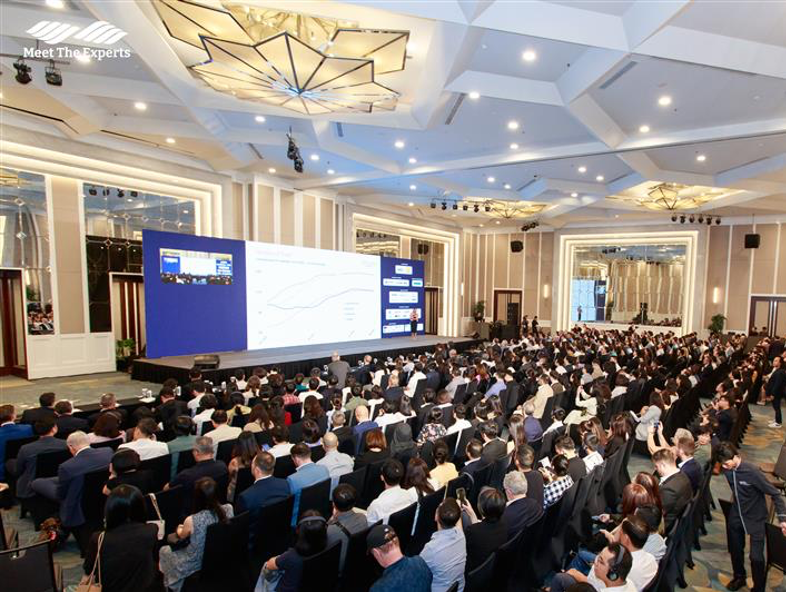 |
Innovation and strategy in focus
Keynote speakers from VinaCapital, HotStats, and Savills Hotels provided valuable insights on macroeconomic trends, global and local hotel trading performance, the draw of luxury retail brands in mixed-use developments, and innovations in branded residences. Radisson Hotel Group, Cloud Collective, and Dark Horse Architecture presented pioneering concepts in lifestyle hotels, luxury glamping, and sustainable resorts in Bali, offering strategies for the future of the hospitality sector.
Savills, TCC Land International, Hoiana Resort & Golf, Alphanam Group, Meliá Hotels International, MIK Group, and Indochina Kajima highlighted key aspects of ultraluxury projects, focusing on differentiators in an increasingly competitive market.
They also discussed the rise of branded residences in urban areas such as Hanoi and Ho Chi Minh City, illustrating how branding enhances property value. Additionally, the integration of wellness features into hospitality and real estate projects is gaining importance as consumer expectations evolve, offering guests and residents enhanced wellbeing and comfort.
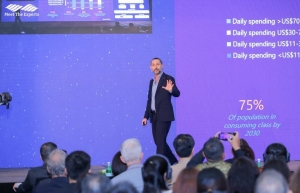 | Hospitality and real estate navigate uncertainty Hotel occupancy rates in Southeast Asia have trended upward since the reopening of all major markets. However, a competitive labour market, rising energy costs, geopolitical tensions, and expensive travel continue to impact hospitality demand. |
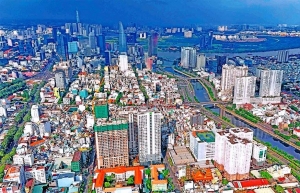 | Long-awaited project launches offer cheer A series of housing schemes are being introduced in the market, taking advantage of opportunities for housing to recover in 2024. |
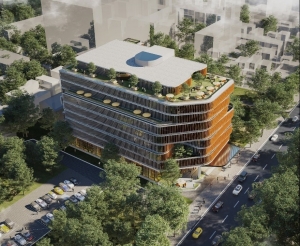 | Hanoi’s latest Grade A commercial project soon ready for handover The demand for high-quality Grade A offices is on the rise, particularly for projects with prime locations that adhere to environmental, social, and governance (ESG) criteria and provide convenient connectivity. |
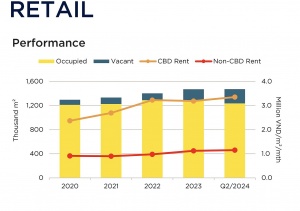 | Retail properties see vacancies increase Savills Hanoi's market brief for the first half of 2024 was released on July 11 and shows that major shopping centres in the capital are witnessing an increase in available leasing space. |
What the stars mean:
★ Poor ★ ★ Promising ★★★ Good ★★★★ Very good ★★★★★ Exceptional
Related Contents
Latest News
More News
- Sheraton Phu Quoc rolls out Lunar New Year 2026 cultural and dining programme (February 11, 2026 | 09:00)
- Fairmont opens first Vietnam property in Hanoi (February 04, 2026 | 16:09)
- Marriott signs major deal to expand luxury hotel footprint in Vietnam (February 04, 2026 | 15:58)
- Welcome Year of the Horse at Four Seasons Resort The Nam Hai (January 30, 2026 | 16:18)
- The Grand Ho Tram to host the first-ever IBF convention in Southeast Asia (January 29, 2026 | 12:18)
- Danang Marriott ushers in Lunar New Year by the sea (January 28, 2026 | 11:42)
- Angsana and Dhawa Ho Tram offer a serene Lunar New Year retreat (January 23, 2026 | 23:38)
- Tides of Heritage: A Tet speciality at InterContinental Phu Quoc Long Beach (January 20, 2026 | 12:08)
- Muong Thanh launches Lunar New Year gifts inspired by tradition (January 16, 2026 | 16:41)
- The Grand Ho Tram seeks responsible entertainment with pilot casino access (January 16, 2026 | 10:56)

 Tag:
Tag:
























 Mobile Version
Mobile Version